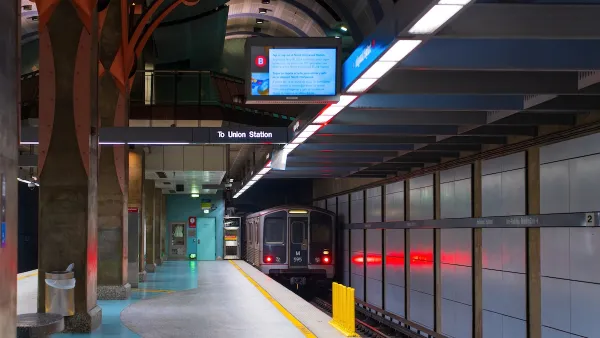In the latest entry in its fascinating series on the "Laws That Shaped L.A.", KCET's Jeremy Rosenberg looks at the city's brief, but golden, age of the Jitneys, and whether they deserve a return to L.A.'s growing mix of transit modes.
Rosenberg targets Chapter 213 from the Laws of 1917, nominated by James Rojas, city planner and founder of Place It! workshops and the Latino Urban Forum, one of "a series of escalating public policy and enforcement obstacles enacted
during that era that crashed the jitneys' fast-growing business model
while preserving the mass public transportation status quo."
So what's so important about Jitneys? According to Rosenberg, in their golden age, "L.A.'s jitneys often traveled alongside established and maintained
streetcar lines. Jitneys charged a bargain five cents per ride. Jitneys
were more responsive to the micro-needs of passengers. Jitneys required
very little capital expense to operate."
Jitneys can play an important role in reaching under-served communities today, at a reasonable price, and can fill the gaps in L.A.'s growing transit system. "[A jitney is] market and demand driven, flexible, and requires very
little subsides," Rojas says. "It reaches any location in L.A. County
where there is a road, any time of day."
"Rojas is not in favor of privatizing everyone's commute...Instead, Rojas pushes for equanimity. 'I think we have to let the
free market help solve public transportation,' he says. 'Its like the
NYC MTA runs the buses and subways and private companies run the taxis.
It's a balanced set-up.'"
FULL STORY: Free the Jitney! When Buses, Rail, Bikes and Feet Ain't Enough

Maui's Vacation Rental Debate Turns Ugly
Verbal attacks, misinformation campaigns and fistfights plague a high-stakes debate to convert thousands of vacation rentals into long-term housing.

Planetizen Federal Action Tracker
A weekly monitor of how Trump’s orders and actions are impacting planners and planning in America.

Chicago’s Ghost Rails
Just beneath the surface of the modern city lie the remnants of its expansive early 20th-century streetcar system.

Bend, Oregon Zoning Reforms Prioritize Small-Scale Housing
The city altered its zoning code to allow multi-family housing and eliminated parking mandates citywide.

Amtrak Cutting Jobs, Funding to High-Speed Rail
The agency plans to cut 10 percent of its workforce and has confirmed it will not fund new high-speed rail projects.

LA Denies Basic Services to Unhoused Residents
The city has repeatedly failed to respond to requests for trash pickup at encampment sites, and eliminated a program that provided mobile showers and toilets.
Urban Design for Planners 1: Software Tools
This six-course series explores essential urban design concepts using open source software and equips planners with the tools they need to participate fully in the urban design process.
Planning for Universal Design
Learn the tools for implementing Universal Design in planning regulations.
planning NEXT
Appalachian Highlands Housing Partners
Mpact (founded as Rail~Volution)
City of Camden Redevelopment Agency
City of Astoria
City of Portland
City of Laramie




























